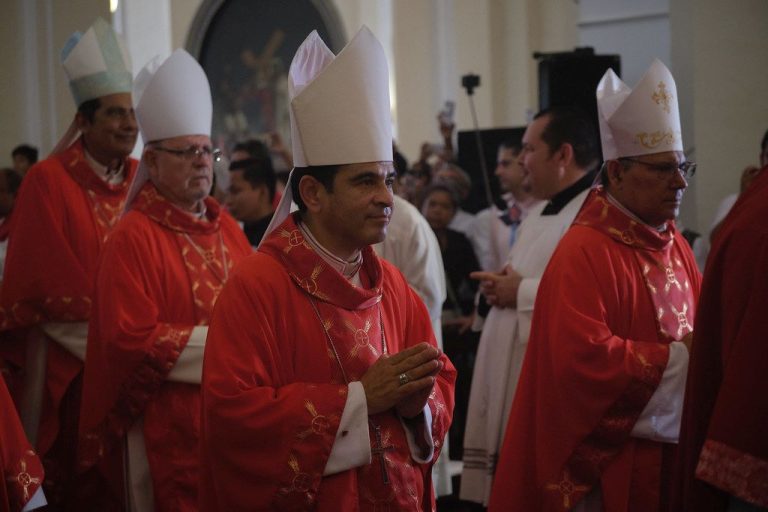11 de julio 2023

Children of Exile: The Births “Sowing Hope” in the Camp of Nicaraguan Farmers

PUBLICIDAD 1M
PUBLICIDAD 4D
PUBLICIDAD 5D
56% of those who identify as Sandinistas have an unfavorable opinion of the 26-year sentence given to the Álvarez for alleged "conspiracy"

Monsignor Rolando José Álvarez, bishop of Estelí, during the inauguration of Sócrates René Sándigo as bishop of León, in 2019. Photo: Confidencial
The prison sentence of 26 years and four months given to the bishop of Matagalpa, Monsignor Rolando José Álvarez Lagos, is disapproved of by 79% of Nicaraguans, according to the results of a public opinion poll by the Costa Rican firm CID Gallup, contracted by CONFIDENCIAL to carry out the survey.
To the question: How favorable is your opinion of the prison sentence given to Monsignor Álvarez?, 79% responded "not at all" or "not very" favorable," while 21% answered "somewhat" or "very" favorable.
Based on political affiliation, 56% of those who identified themselves as "Sandinistas" said their opinion of the sentence was "not at all" or "not very" favorable, while the remaining percentage was in favor of the sentence, according to the public opinion survey, carried out between June 14 and 20, 2023.
The survey was carried out with 823 respondents who were interviewed via cell phone calls. The margin of error is +/-2.93% and the confidence level is 95%, according to the technical data sheet.
This is the first public opinion poll to ask about the conviction of, and sentence against, Álvarez for the alleged crimes of "conspiracy" and "propagation of fake news". The bishop was sentenced on February 10, 2023 in an "express" trial held one day after he refused to board a plane that would have taken him to the United States along with 222 other political prisoners who were deported and stripped of their nationality. That same day, he was stripped of his nationality and transferred to a maximum security cell in the Jorge Navarro National Prison, better known as "La Modelo."
Diplomatic and ecclesiastical sources informed CONFIDENCIAL that the bishop was escorted out of La Modelo prison on the night of Monday, July 3, but returned a day later to the maximum security cell, after "negotiations" between the dictatorship, the Episcopal Conference and the Vatican to "release him and send him into exile" failed.
"The only circumstances in which Monsignor Álvarez would agree to go into exile is if Pope Francis asked or ordered him to do so. That did not happen earlier, nor has it happened in the talks they held this week with a diplomatic representative of the Vatican," said one of the sources.
Monsignor Álvarez also demanded the release of the five detained priests as well as the unfreezing of the Catholic Church’s bank accounts, but his requests were rejected by the representatives of the regime in the negotiation.
On June 28, 2023, the Inter-American Court of Human Rights issued a resolution ordering the Ortega-Murillo dictatorship to release the bishop. The regime disregarded the judicial sentence.
The Catholic Church and its bishops and priests mediated in the 2018 and 2019 attempts at national dialogue and backed the demand for freedom for political prisoners, and then received attacks and threats from the dictatorship and its operators.
The pressure exerted by the regime of Daniel Ortega and Rosario Murillo against the Catholic Church increased in 2022, when the government –using its repressive apparatus, headed by the National Police– began to close Catholic radio stations, desecrate churches, expel priests and nuns from the country –more than 80 by July 2023–, as well as prohibit processions, and imprison, banish and strip priests of their nationality. The dictatorship also suspended diplomatic relations between Managua and the Holy See.
Ortega ordered the unilateral suspension of diplomatic relations with the Vatican on March 12, 2023, a few hours after the publication of an interview in which Pope Francis described the Sandinista government as a "Hitlerian dictatorship", whose maximum leader, Daniel Ortega, he commented, "with much respect," suffers from "an imbalance."
CID Gallup asked Nicaraguan respondents: Do you consider the suspension of diplomatic relations with the Vatican appropriate? 62% answered "no", 25% "yes" and 13% "I don't know" or "I decline to answer."
Since April 2018, Ortega has been in the habit of publicly attacking the Nicaraguan bishops whom he labels "mafiosos," "terrorists" and "coup plotters". He has also accused them –without evidence– of being accomplices to both domestic forces and international groups who, in Ortega's opinion, "are acting in Nicaragua to overthrow” him.
This article was originally published in Spanish in Confidencial and translated by our staff.
PUBLICIDAD 3M
Confidencial es un diario digital nicaragüense, de formato multimedia, fundado por Carlos F. Chamorro en junio de 1996. Inició como un semanario impreso y hoy es un medio de referencia regional con información, análisis, entrevistas, perfiles, reportajes e investigaciones sobre Nicaragua, informando desde el exilio por la persecución política de la dictadura de Daniel Ortega y Rosario Murillo.
PUBLICIDAD 3D